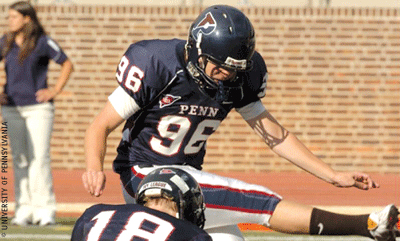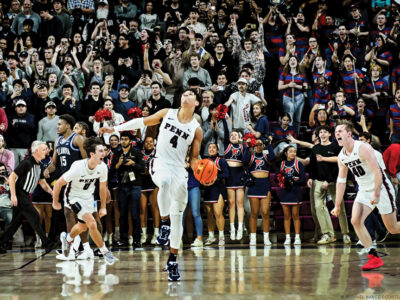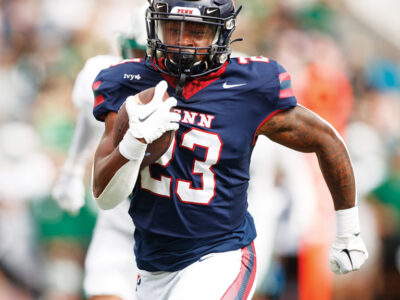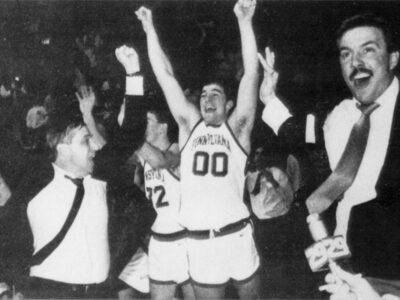
By David Porter
Encouraging signs abounded as Penn’s football team approached the midway point of the 2008 season, including a return to one of the bedrocks of Al Bagnoli-coached teams.
To the latter point, we offer a defense that through four games displayed a remarkable talent for shutting down opposing offenses in the later portions of games. In fact, the Quakers allowed a total of only 10 second-half points in that span, which included 30-minute shutouts of Villanova and Lafayette—ironically, the two games Penn lost. Yet both of those efforts should be applauded since the Leopards had dropped 24 first-half points on the Quakers and Villanova is, well, Villanova.
Stingy defense has been a hallmark of Bagnoli’s teams for most of his 16 seasons at Penn, albeit with a little slippage in recent seasons. This year’s unit, led by defensive backs Chris Wynn, a junior, and senior Tyson Maugle and linebackers Jay Colabella (senior) and Jake Lewko (junior), is out to reverse that trend. Through the first four games of the season, they had allowed a little over two touchdowns per game, or four points fewer than in 2007.
Yet any enthusiasm generated by the Quakers’ defense had to be tempered by an offense that struggled to achieve consistency.
“We’re still the ‘30-Minute Wonders’—especially on offense,” Bagnoli said before Penn’s 27-7 rout of Georgetown on October 11. “I’m not sure exactly what’s causing all of this, but it’s taking us too long to get everything running efficiently. So it’s something that I’ve got to put my finger on and figure out what’s causing it and we’ve just got to be able to change and play 60 minutes. It’s something that’s still a concern for me.”
Bagnoli saw 60 minutes of quality effort against a struggling Georgetown team that has never defeated Penn and had had to cancel its game the previous week after a flu bug hit the team. Wynn ran the opening kickoff back 88 yards for a touchdown, the second such feat in as many seasons for the Quakers.
That made it two straight wins for Penn after a 23-10 victory over Dartmouth the week before in which the offense awoke for 16 second-half points and the defense nearly held the Big Green to negative yards rushing.
The losses to Lafayette and Villanova followed disheartening patterns from Penn’s recent past. Bagnoli has never defeated Villanova, and he came close again on the season opener on September 20 before losing 20-14 in overtime. This time it was a fumble by sophomore Bradford Blackmon on the Quakers’ first possession of the extra period, after the Wildcats had scored on their first possession.
Another rally fell short in a 24-17 loss to Lafayette, a team the Quakers used to dominate but have now lost to twice in a row. More troubling is that Penn is 2-9 in its last 11 games that were decided by a touchdown or less.
That trend may turn around as well, with the emergence of sophomore Andrew Samson as a consistently reliable kicker. The West Bloomfield, Michigan, native missed his first field goal against Villanova but made his next six in a row, and was a perfect nine-for-nine on extra points.
“He has played in so many close games,” Bagnoli said. “It’s nice to be able to have confidence in him, and he has that confidence in himself.”
Glen Miller has experienced the extremes as Penn’s basketball coach. He won the Ivy title in his first year, then finished third last season, which in Quakerland is akin to finishing last. Not that Miller is complaining.
“There are higher expectations here than there are at any other program in the league,” he said as the Quakers prepared to open practice on October 17. “We have a lot of hard work to do. But anyone who coaches or plays embraces those challenges.”
Penn’s 13-18 record in 2007-2008 was the program’s first sub-.500 finish since 2000-2001, and the young team’s inconsistency was reflected in the fact that the Quakers never lost more than three games in a row but never won more than two straight, either. The last time that happened was in 2000-2001, not surprisingly.
That earlier Penn team bridged the gap between the Michael Jordan-Matt Langel-Paul Romanczuk teams that went 27-1 in the Ivy League and the Ugonna Unyekwe-Koko Archibong-Andrew Toole juggernaut that won 25 of 28 league games.
Considering the renewed strength of the league, duplicating those achievements is a tall order. Cornell returns virtually its entire team that went 14-0 last season, and Harvard’s recruiting class under head coach Tommy Amaker was considered one of the best in the league’s history. But the Quakers appear primed to improve on last year’s 8-6 league mark.
Penn returns six of its top seven scorers, the exception being leading scorer and rebounder Brian Grandieri C’08. Sophomore Tyler Bernardini was right behind Grandieri at 12.9 points per game, and fellow sophs Harrison Gaines and Jack Eggleston all averaged 22 minutes or more. Much will depend on the contributions of role players such as senior Kevin Egee, who set a school record by shooting 51 percent (20-for-39) from 3-point range two years ago but tailed off somewhat last year (24-for-69).
Two players who missed last season with injuries could contribute as well. Junior Darren Smith suffered a knee injury in the season opener and underwent surgery, and was finally cleared to resume practice in August.
“He’s still not 100 percent,” Miller said. “I think he can get there. It’s a matter of time. He’s building up his strength. He’s probably practicing at about 75 percent right now. The key thing is going to be getting the muscles in that leg back to where they’re equal to the muscles in his other leg, so he’s balanced.”
Smith had the unusual distinction of shooting better from 3-point range (48 percent) in 2006-2007 than he did from 2-point range (34 percent).
Senior Tommy McMahon, who missed last season with back and hip problems, may have a tougher road back. McMahon started 11 games in 2006-2007 and averaged five points in 18 minutes of action.
“He’s coming along well,” Miller said. “The challenge for him is going to be when official practice starts and he has to go from practicing six hours to 20 hours a week, and whether his back can hold up to the physical demands.”
Penn will be tested from the first jump ball: The Quakers open at North Carolina, a team likely to be ranked No. 1 in the country. They also will renew a recently dormant series with Penn State and face Albany, a mid-major team coming off two NCAA Tournament appearances in the last three seasons.
David Porter C’82 writes for the Associated Press.
Competitive Instinct
When Penn’s women’s volleyball team decided to use an October 24 game against Dartmouth as a fund raiser for Breast Cancer Awareness Month, they hardly could have imagined how intimately the disease would touch them.
As the Quakers prepared to take part in the “Dig Pink” event, their coach, 11-year veteran Kerry Carr, was scheduled to be recovering from a bilateral mastectomy and reconstruction after being diagnosed with cancer in September.
“It was definitely a shock,” senior Kathryn Turner said. “You never expect it to happen to someone close to you. But we all knew she needed to do what was best for her.”
Planning the fund raising event back in August had proved fortuitous: Carr said it prodded her to schedule her annual mammogram in early September. That was where she was first diagnosed, but the initial prognosis was comparatively upbeat: Surgery followed by six weeks of radiation that would enable Carr to continue coaching.
More tests followed, though, and an MRI revealed the cancer to be more advanced than initially feared. Still, Carr’s competitive instincts kicked in, and she laughed as she recalled how she tried to figure out a way to postpone surgery until after the season.
“I needed to know why I couldn’t wait,” she said. “Then the doctor said it could grow into something worse in two weeks. At that point it became a no-brainer. But someone basically had to hit me over the head because I wasn’t feeling sick or anything.”
Coaching provided a welcome distraction. Carr, who led the Quakers to Ivy titles in 2001, 2002, and 2003, received the second diagnosis two hours before Penn faced Villanova on September 20, and the Quakers also played a match the next day. She had told the players about the first diagnosis during a team trip to Florida in mid-September; the second time was more difficult, but she remained positive.
“I told them that even though it sucks to have this thing in my life, it’ll be a good thing,” she said. “It’s not a death sentence.”
In Carr’s absence, her role has been assumed by assistant coach Ryan Goodwin, who she called “basically my co-head coach, anyway.” Goodwin, who came to Penn in January after serving as an assistant at the University of Portland, shrugged off the compliment.
“She’s being generous,” he said. “It’s more that we’re in lockstep when it comes to how we see the game. So we don’t need to change the perspective of the program. But we are definitely going to miss her personality and determination.”
—D.P.




